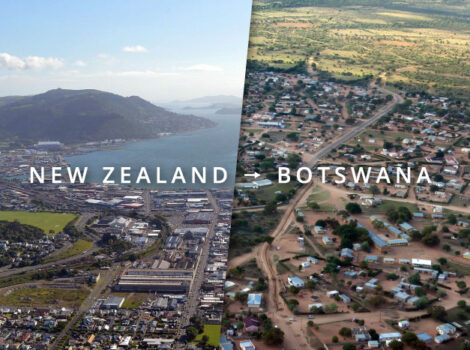
Given Botswana’s escalating unemployment rate, many employers continue to enjoy bargaining power over the desperate job seekers, resulting in declining wages in the past several years – official figures show.
The latest formal employment figures from a survey carried out by the national statistics agency – Statistics Botswana and published in May 2019 – pegs the employment growth at 0.9 percent between September 2018 and December 2018. The same survey shows that employee earnings increased from P6, 347 in September 2018 to P6, 533 in December 2018, an increase of 2.9 percent.
The Botswana government recently unveiled the new minimum wage structure following months of mounting pressure from some sections of the society who view the prevailing minimum wage as modern-day slavery. In fact, just less than 12 months ago, the government was sent scuttling for cover when the main opposition party, Umbrella for Democratic Change (UDC), lambasted it for enabling the low wages that continue to haunt employees. The UDC is going into the looming general elections with the promise of a minimum wage almost three times the highest rung of the current minimum wage.
Possibly shunning the UDC’s P3, 000 minimum wage suggestion, the government through the ministry of Employment, Labour Productivity and Skills Development announced a 17 percent wage hike. This translates to no more than P1 per hour across various sectors. A press statement from the government enclave indicates that the new basic minimum wage has been set at P6.77 per hour for almost all the regulated trades except the domestic servants and agricultural sectors, whose minimum pay is pegged at P1, 000.
Middle finger to the middle class
In March 2018, emotions boiled over with the workers at one of the country’s leading retail companies – Choppies Enterprises’s hyper store located at the Westgate Mall in the capital Gaborone downing tools and demanding better pay. At the time, it was reported that the employees along with others from the retail sector earned a paltry P900 per month. The latest revision will see retail sector workers pocketing an extra P0.87 per hour worked. Other players in the mass grocery sub-sector include Botswana Stock Exchange-listed Sefalana Holdings, as well as South African retail giants, Pick n Pay, Spar and Shoprite, among others. The retail sector currently employs 50,521 Batswana, 26,895 of them male and the remaining 23,626 being female.
While Botswana’s trade labour laws currently favour a minimum wage that is revised on an annual basis, BOFEPUSU – the Botswana Federation of Public Parastatal and Private Sector Unions says it advocates for a living wage over minimum wage. Employees and employers around the world continue to argue over the issue of minimum wage. On the one hand, employees prefer to receive a minimum “living” wage that allows them to meet their basic needs such as food, clothing and shelter. Employers, on the other hand, say that high labour costs will affect their company’s profitability and its value to shareholders.
In the middle, governments worry that they will lose trade, investment and tax revenues if labour costs within their borders go too high. In June 2018, Shaun Nthaile, an opposition legislator, proposed a motion in parliament to introduce a decent living wage of at least P3,000, with the higher wage seen as a remedy for years of low wages against rising living costs. However, the motion was muzzled and rejected by the ruling party, which commands the majority of legislators.
Instead, Tshenolo Mabeo, Minister of Employment, Labour Productivity and Skills Development said the issue of minimum wages and living wages is before the Ministry of Finance and Economic Development, which is doing the research and assessment. He said they are looking at the issues around minimum wage and living wage and only after they have concluded their assessment will his ministry assess how to resolve the issue. Mabeo added that the International Labour Organisation has assisted the Botswana government with a report focused on finding figures that give a picture of the shortcomings of the minimum wage. He revealed that the report indicated that the major challenge identified has been a lack of data.
While there is a general call for a significant hike in wages in Botswana, an economic commentator and managing director at Econsult Botswana – Dr Keith Jefferies cautioned against that in 2018. He said at the time that too huge a hike could lead to unemployment.
Going nowhere fast…
Jefferies, the former Bank of Botswana Deputy Governor possibly subscribes to the notion that a huge hike in the minimum wage would result in companies with a large portion of their workforce on the minimum wage being unable to bear the cost of the increase, resulting in job losses.
On how urgent Botswana needs to attend to the issue of the wage gap given recent developments in the labour sector, Dr Jefferies says,
“I think there is an argument for raising the minimum wage, although I do not know by how much, given that the share of GDP being paid in wages has been declining and inequality is high”.
As it prepares to usher in a new administration in October 2019, Botswana continues to face the challenge of bridging the wage inequality gap and improving the overall living wage for entry-level, unskilled and semi-skilled workers. The latest revised wages have, however, drawn a wave of criticism, particularly on social media. Chiefly among the concerns, is that the new rates would not have much impact on the worker’s salary.
A worker already on the highest rate of P5.79 per hour, working 40 hours per week gets a monthly pay of P927, which rises to only P1, 080 with the new adjustment. The criticism might stall the ruling party’s momentum as it ramps up support from employees for the October general elections. Besides jobs creation, employee welfare has become a major talking point going into the general elections. While the economy has been growing at a steady pace and corporate earnings rising, the opposite has been happening in the labour market. This has fuelled opposition parties’ campaigns based on increasing wages and reversing years of income inequality. They assert it has been perpetuated by the ruling party’s policies that put business interests ahead of citizens’ welfare.
Adapted from Victor Baatweng @sundaystandard’s article: “Botswana workers going nowhere slowly”



